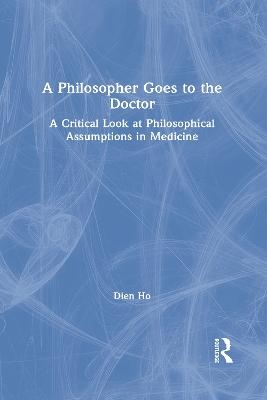
A Philosopher Goes to the Doctor
A Critical Look at Philosophical Assumptions in Medicine
Seiten
2019
Routledge (Verlag)
978-1-138-64778-7 (ISBN)
Routledge (Verlag)
978-1-138-64778-7 (ISBN)
- Titel z.Zt. nicht lieferbar
- Versandkostenfrei innerhalb Deutschlands
- Auch auf Rechnung
- Verfügbarkeit in der Filiale vor Ort prüfen
- Artikel merken
This book sheds light on important philosophical assumptions made by professionals working in clinical and research medicine. In doing so, it aims to make explicit how active philosophy is in medicine and shows how this awareness can result in better and more informed medical research and practice.
It examines: what features make something a scientific discipline; the inherent tensions between understanding medicine as a research science and as a healing practice; how the “replication crisis” in medical research asks us to rethink the structure of knowledge production in our modern world; whether explanations have any real scientific values; the uncertainties about probabilistic claims; and whether it is possible for evidence-based medicine to truly be value free. The final chapter argues that the most important question we can ask is not, “How can we separate values from science?” but, “In a democratic society, how can we decide in a politically and morally acceptable way what values should drive science?”
Key features:
introduces complex philosophical issues in a manner accessible to non-professional academics;
critically examines philosophical assumptions made in medicine, providing a better understanding of medicine that can lead to better healthcare;
integrates medical examples and historic contexts so as to frame the rationale of philosophical views and provide lively illustrations of how philosophy can impact science and our lives;
uses inter-connected chapters to demonstrate that disparate philosophical concepts are deeply related (e.g., it shows how the aims of medicine inform how we should understand theoretical reasoning).
It examines: what features make something a scientific discipline; the inherent tensions between understanding medicine as a research science and as a healing practice; how the “replication crisis” in medical research asks us to rethink the structure of knowledge production in our modern world; whether explanations have any real scientific values; the uncertainties about probabilistic claims; and whether it is possible for evidence-based medicine to truly be value free. The final chapter argues that the most important question we can ask is not, “How can we separate values from science?” but, “In a democratic society, how can we decide in a politically and morally acceptable way what values should drive science?”
Key features:
introduces complex philosophical issues in a manner accessible to non-professional academics;
critically examines philosophical assumptions made in medicine, providing a better understanding of medicine that can lead to better healthcare;
integrates medical examples and historic contexts so as to frame the rationale of philosophical views and provide lively illustrations of how philosophy can impact science and our lives;
uses inter-connected chapters to demonstrate that disparate philosophical concepts are deeply related (e.g., it shows how the aims of medicine inform how we should understand theoretical reasoning).
Dien Ho is an Associate Professor of Philosophy and Healthcare Ethics at MCPHS University, USA. His recent publications include an edited anthology, Philosophical Issues in Pharmaceutics: Development, Dispensing, and Use (2017). He has also written for non-academic publications including Newsweek, Philosophy Now!, The Boston Globe, and other popular media.
Annotated Table of Contents
A Note on the Cover
Introduction
Chapter 1: The Boundaries of Medicine
Chapter 2: The Concept of Health
Chapter 3: Evidence in Medicine
Chapter 4: Explanations in Medicine
Chapter 5: Probability in Medicine
Chapter 6: Value-Free Medicine
Chapter 7: Truth and Happiness
Index
| Erscheinungsdatum | 20.06.2019 |
|---|---|
| Zusatzinfo | 4 Line drawings, black and white; 22 Halftones, black and white; 26 Illustrations, black and white |
| Verlagsort | London |
| Sprache | englisch |
| Maße | 152 x 229 mm |
| Gewicht | 470 g |
| Themenwelt | Sachbuch/Ratgeber ► Gesundheit / Leben / Psychologie |
| Geisteswissenschaften ► Philosophie ► Erkenntnistheorie / Wissenschaftstheorie | |
| Geisteswissenschaften ► Philosophie ► Ethik | |
| Geisteswissenschaften ► Philosophie ► Metaphysik / Ontologie | |
| Medizin / Pharmazie ► Gesundheitsfachberufe ► Hebamme / Entbindungspfleger | |
| Studium ► Querschnittsbereiche ► Prävention / Gesundheitsförderung | |
| Naturwissenschaften | |
| ISBN-10 | 1-138-64778-0 / 1138647780 |
| ISBN-13 | 978-1-138-64778-7 / 9781138647787 |
| Zustand | Neuware |
| Informationen gemäß Produktsicherheitsverordnung (GPSR) | |
| Haben Sie eine Frage zum Produkt? |
Mehr entdecken
aus dem Bereich
aus dem Bereich
das Manual zur psychologischen Gesundheitsförderung
Buch | Hardcover (2023)
Springer Berlin (Verlag)
39,99 €
Wissenschaftlich basierte Empfehlungen, Tipps und Ernährungspläne für …
Buch (2022)
Thieme (Verlag)
51,00 €


